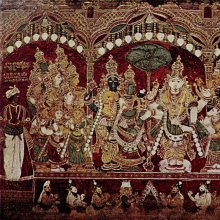Sundareshvara, Sundareśvara: 4 definitions
Introduction:
Sundareshvara means something in Hinduism, Sanskrit. If you want to know the exact meaning, history, etymology or English translation of this term then check out the descriptions on this page. Add your comment or reference to a book if you want to contribute to this summary article.
The Sanskrit term Sundareśvara can be transliterated into English as Sundaresvara or Sundareshvara, using the IAST transliteration scheme (?).
Images (photo gallery)
In Hinduism
Shilpashastra (iconography)
Source: Wisdom Library: Elements of Hindu IconograpyThe god Sundareśvara (the name of the God Śiva enshrined in Madura) is said to have indulged in sixty-four līlās or sports, which are also narrated in later works such as Śivalīlārṇava. In all these līlās, Śiva assumed human and other forms for the purpose of succouring help to some one in need of it. For example, reference may be made to legends according to which he was once pleased to grant heaven to a pious crane; he taught the Mṛtyuṅjaya-mantra to a black-bird to protect itself and its species from the aggressions of stronger species; he once took pity upon a litter of motherless pigs and acted the part of their mother and eventually caused them to be re-born as the sons of a humanbeing and bestowed upon them the office of the ministers of the Pāṇḍya king and so on.
All these sports of Śiva at Madura are materialised into stone sculptures which are to be seen everywhere in the extensive temple not only of Madura but also in temples situated in many places adjoining Madura.

Shilpashastra (शिल्पशास्त्र, śilpaśāstra) represents the ancient Indian science (shastra) of creative arts (shilpa) such as sculpture, iconography and painting. Closely related to Vastushastra (architecture), they often share the same literature.
Vaishnavism (Vaishava dharma)
Source: Prabhupada Books: Sri Caitanya CaritamrtaSundareśvara (सुन्दरेश्वर) refers to a Śiva temple near Mādurā.—Southern Madurai, presently known as Mādurā, is situated on the banks of the Bhāgāi River. This place of pilgrimage is specifically meant for the devotees of Lord Śiva; therefore it is called Śaiva-kṣetra, that is, the place where Lord Śiva is worshiped. In this area there are mountains and forests. There are also two Śiva temples, one known as Rāmeśvara and the other known as Sundareśvara.

Vaishnava (वैष्णव, vaiṣṇava) or vaishnavism (vaiṣṇavism) represents a tradition of Hinduism worshipping Vishnu as the supreme Lord. Similar to the Shaktism and Shaivism traditions, Vaishnavism also developed as an individual movement, famous for its exposition of the dashavatara (‘ten avatars of Vishnu’).
Languages of India and abroad
Sanskrit dictionary
Source: Cologne Digital Sanskrit Dictionaries: Monier-Williams Sanskrit-English DictionarySundareśvara (सुन्दरेश्वर):—[from sundara > sund] m. Name of a form of Śiva
[Sanskrit to German]
Sanskrit, also spelled संस्कृतम् (saṃskṛtam), is an ancient language of India commonly seen as the grandmother of the Indo-European language family (even English!). Closely allied with Prakrit and Pali, Sanskrit is more exhaustive in both grammar and terms and has the most extensive collection of literature in the world, greatly surpassing its sister-languages Greek and Latin.
See also (Relevant definitions)
Starts with: Sundareshvarastotra, Sundareshvarastuti.
Ends with: Kalyāṇa-Sundareśvara, Minakshi-Sundareshvara.
Full-text: Minakshi-Sundareshvara, Sundareshvarastotra, Minakshi, Cuntarakkatavul, Madura, Rameshvara, Kalyāṇa-Sundareśvara.
Relevant text
Search found 10 books and stories containing Sundareshvara, Sundareśvara, Sundaresvara; (plurals include: Sundareshvaras, Sundareśvaras, Sundaresvaras). You can also click to the full overview containing English textual excerpts. Below are direct links for the most relevant articles:
Early Chola Temples (by S. R. Balasubrahmanyam)
Temples in Nangavaram < [Chapter II - Temples of Parantaka I’s Time]
Vimana and Vimana-devatas < [Chapter XIII - Prasada: Component Parts]
The Cholas < [Chapter XIII - Prasada: Component Parts]
Middle Chola Temples (by S. R. Balasubrahmanyam)
Temples in Palur (Paluvur) < [Parantaka I]
Temples in Brahmadesam < [Chapter II - Temples of Rajaraja I’s Time]
Temples in Tiruvasi < [Aditya I]
Later Chola Temples (by S. R. Balasubrahmanyam)
Temples in Pallavarayanpettai (Kulattur) < [Chapter VIII - Temples of Rajaraja II’s Time]
Appendix: Temples or parts thereof built and miscellaneous facts < [Chapter II - Temples of Kulottunga I’s Time]
Hindu Pluralism (by Elaine M. Fisher)
The Tiruviḷaiyāṭal Purāṇam in Seventeenth-century Madurai < [Chapter 4 - The Language Games of Śiva]
The sites of Multilingual Literary production in Nāyaka-period South India < [Chapter 4 - The Language Games of Śiva]
Pluralism and Public Space < [Introduction]
Puranic encyclopaedia (by Vettam Mani)
Vastu-shastra (5): Temple Architecture (by D. N. Shukla)
Chola Temples (Circa 900-1150 A.D.) < [Chapter 12 - History of Hindu Temples (Prāsādas and Vimānas)]
Temples of Madura, the final phase (from 1600 A.D.) < [Chapter 12 - History of Hindu Temples (Prāsādas and Vimānas)]
